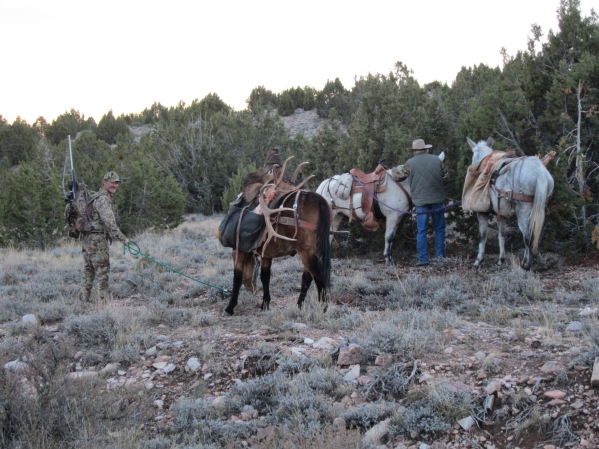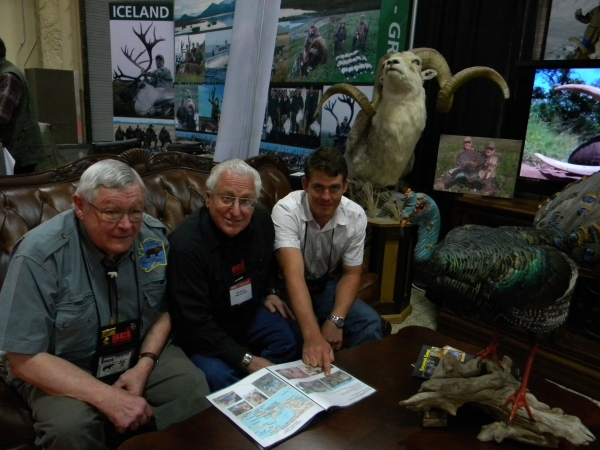Going further afield beyond Nevada for game hunting
You've applied, as I have, for this fall's hunting tag draw - hope you had good luck. If you haven't – it's too late. The application deadline was in June – better luck next year.
The next thing we should be thinking about is what do we do if we actually receive an elk, bighorn sheep or mountain goat tag? The answer to that is to take a look at the previous Sportsman's Quest column (Aug. 14, 2015 at www.pvtimes.com).
If you didn't draw a tag, like me - again, perhaps it's a blessing in disguise; look further afield.
Historically and traditionally, Americans hunted in their own "backyard," or in a "secret spot." We learned the terrain and habits of the animals we hunted. We even felt ownership of "our hunting area." For most of us, it's changed. We're too busy, places have become more crowded with more hunters, shorter seasons and smaller hunting units, forcing us to go further and further afield, and drawing a tag can be uncertain or even doubtful. Using the services of a guide is also becoming more common, especially for the more exotic species such as elk, sheep, mountain goats, and bears. Remember, a true hunter changes with the conditions, habitat and times.
Many states still have over the counter or land owner tags. Try Idaho, Colorado, Texas or Alaska; better yet go on line and search the state of your desire or where you have friends and family.
Personally, I prefer a state like Georgia where a nonresident three-day hunting/fishing combo license costs just $20 and you can buy twelve deer tags or a turkey tag over the counter. Wild boar doesn't require a tag or license. For more information on this go to www.georgiawildlife.com, or give my pal Woody a call at All Seasons Guide Service 770-787-6463.
Transportation is not a great problem. Enjoy a road trip or take advantage of discounted air fares and mileage rewards on your favorite credit card. It can be relatively inexpensive. It requires a bit more research and effort; real hunting always did and if you don't have friends or family in the area the reward is new territory explored and new friends found along the way.
Another good method of research is through local sportsmen's banquets and organizations such as the Rocky Mountain Elk Foundation, The Fraternity of Desert Bighorn, Safari Club International, Nevada Sportsmen Unlimited (NSU) or Wildlife Habitat in Nevada (WHIN). All have local or Las Vegas chapters.
The most common place to consider for a travel hunting adventure is here in the states, but Canada and Africa are also popular common destinations. Let's take a look at these three.
United States
U.S. hunts have more alternatives than the others. They range from do-it-yourself no frills hunts to full service operations where your outfitter meets you and all lodging, meals, transportation and guides are included. Sometimes it even covers the taxidermy work. You just have to worry about being in good physical shape to hunt, and be able to shoot straight when the time comes. The full service hunt is certainly my first choice and is sometimes cheaper than the expense of equipment, a 4-wheel drive, horses and weeks of pre-scouting. The success rate is also much greater.
There is however, great satisfaction in having your own camp and gear. I even like camp cooking. If this is your idea of a hunting experience it may be best to just hire a local guide when hunting a new territory, or a new species. He will have done the pre- season scouting, know the habits of the critter you're looking for, and be able to put you on the game of your choice, again increasing your chances of success.
Some outfitters also act as packers. They will deliver you to an appropriate well-scouted location by horseback or bush plane, and provide a camp. Then you're on your own in a county you would not normally have access to, or knowledge of. This is really popular in Alaska and in wilderness-designated areas.
Another type of guide assistance is using one as a "spotter". They do the pre-season scouting, have recent and current knowledge of the population, and show you a prime area to hunt. We've all wandered around in big new country wondering where all the game has gone. You just need to know where to look and have the time to search, and time is getting harder to find these days.
Remember, all of these possibilities are negotiable with your guide/outfitter. Don't be afraid to let them know what you prefer, or perhaps what your pocketbook allows.
Canada
Canada is beautiful, isolated and has a great abundance of game. But, it isn't cheap. Because of their system of exclusively registered guide territories, competition becomes less of a factor. It's more a case of "What the market will bear," and there's lots of money in the market.
Every serious hunter should try it once, though. Some of the more affordable hunts will cost you a few thousand dollars and are worth saving for. Those include black bear, moose, barren ground caribou and deer. Sheep and grizzly bear, however, can set you back tens of thousands. The last time I checked, a good Stone Sheep hunt ran about fifty thousand dollars.
There are some outstanding guide/outfitters in Canada, but that is not universally true, like in everything these days. So be careful, get references and talk to people who have hunted the area.
The African Safari
Here we're talking luxury on even the most basic hunt. This is especially true of the Republic of South Africa, and even with airfare it's less expensive than Canadian or some U.S. hunts.
You'll be picked up at the airport, transported to a fine isolated hunting lodge, wined and dined in true African style, and have an abundance of game unequaled anywhere in North America. You will not need to search for game, but you will seek the desired animal. Security need not be a great concern, but be careful as is necessary in any third-world country.
This can be the hunt of a lifetime, as I have written in some of my previous columns or discover it in most hunting magazines and on outdoor television programs.
It's true; a great hunt can be had for a few thousand dollars. Some of us have paid that much for equipment, travel and expenses on a hunt here in Nevada and we've not always been successful. So enjoy a little travel and search for that new adventure.
Sportsman's Quest is conducting a survey and would appreciate your commenting on the types of stories you most enjoy.
For more information about places in the column, or on "Sportsman's Quest" the book, please email me, dansimmons@usa.net or visit us at www.sportsmansquest.org.


















